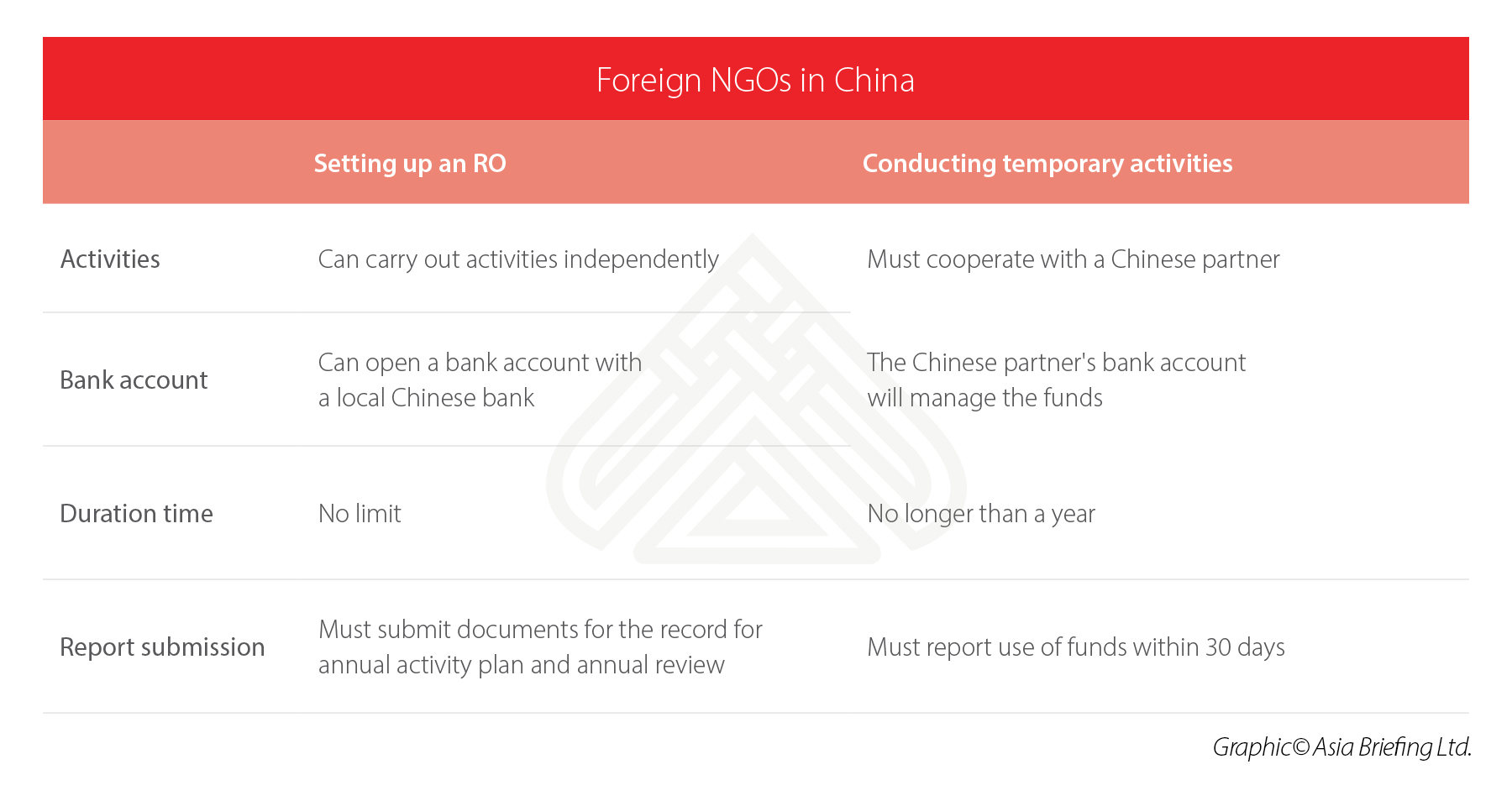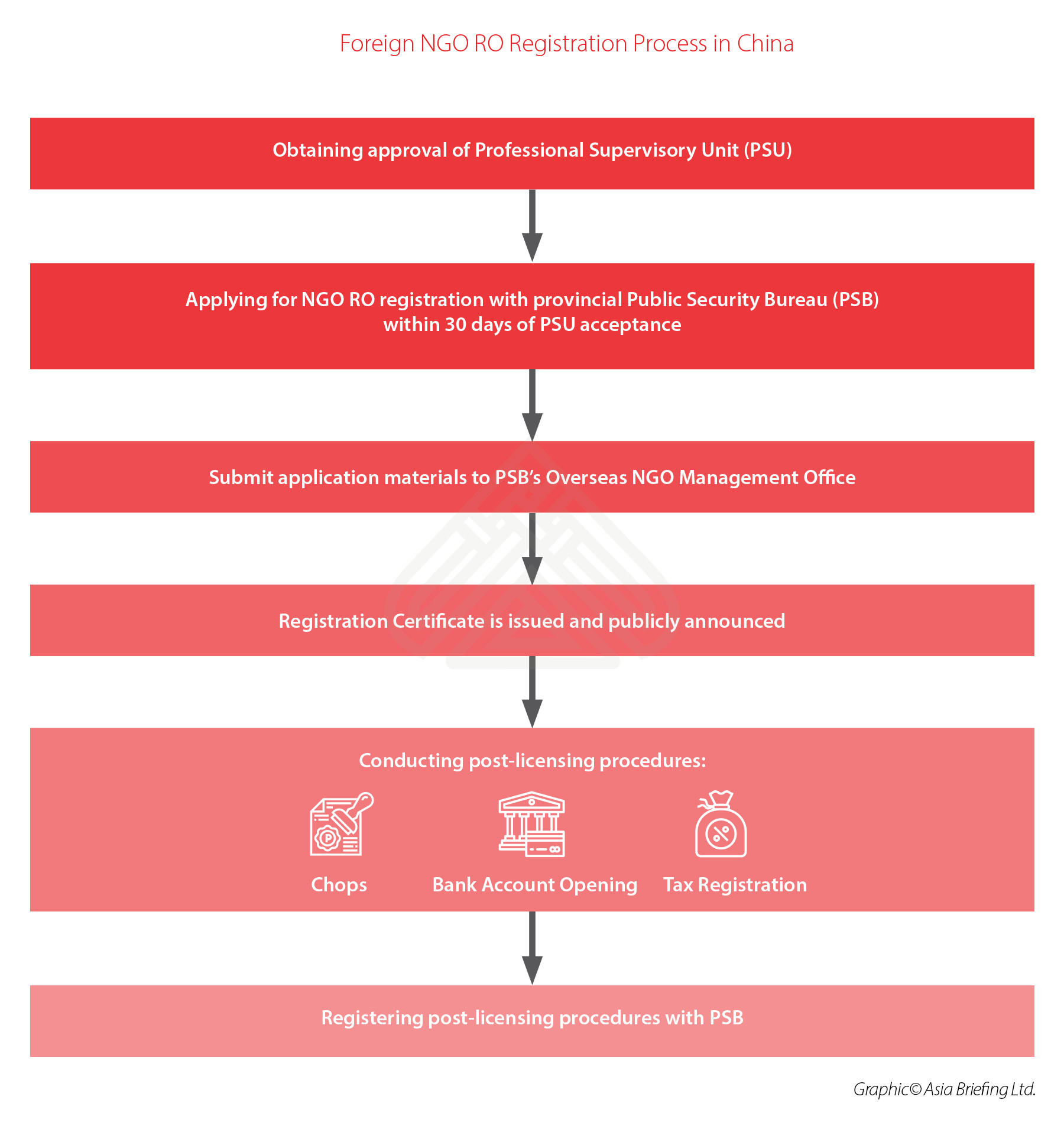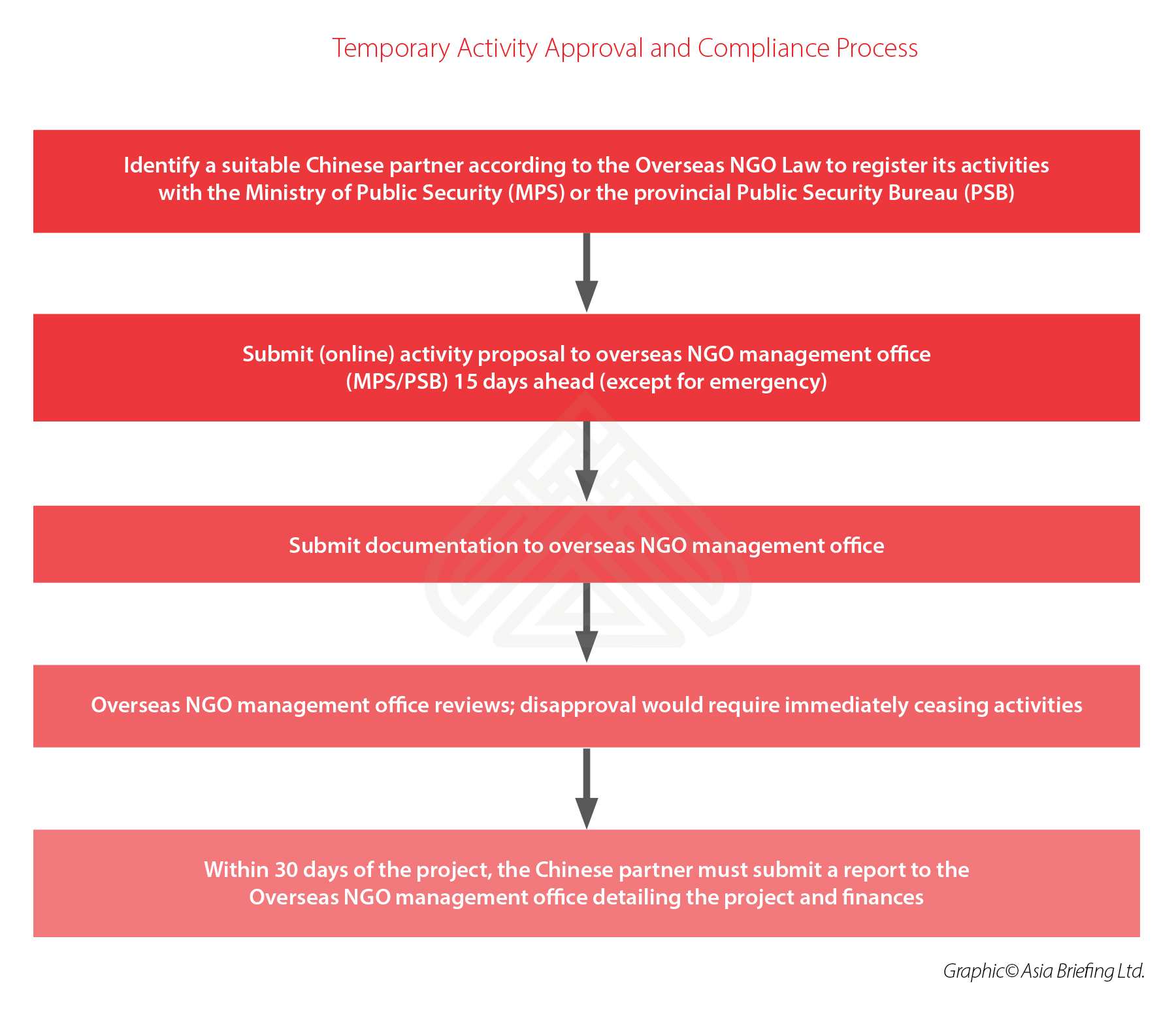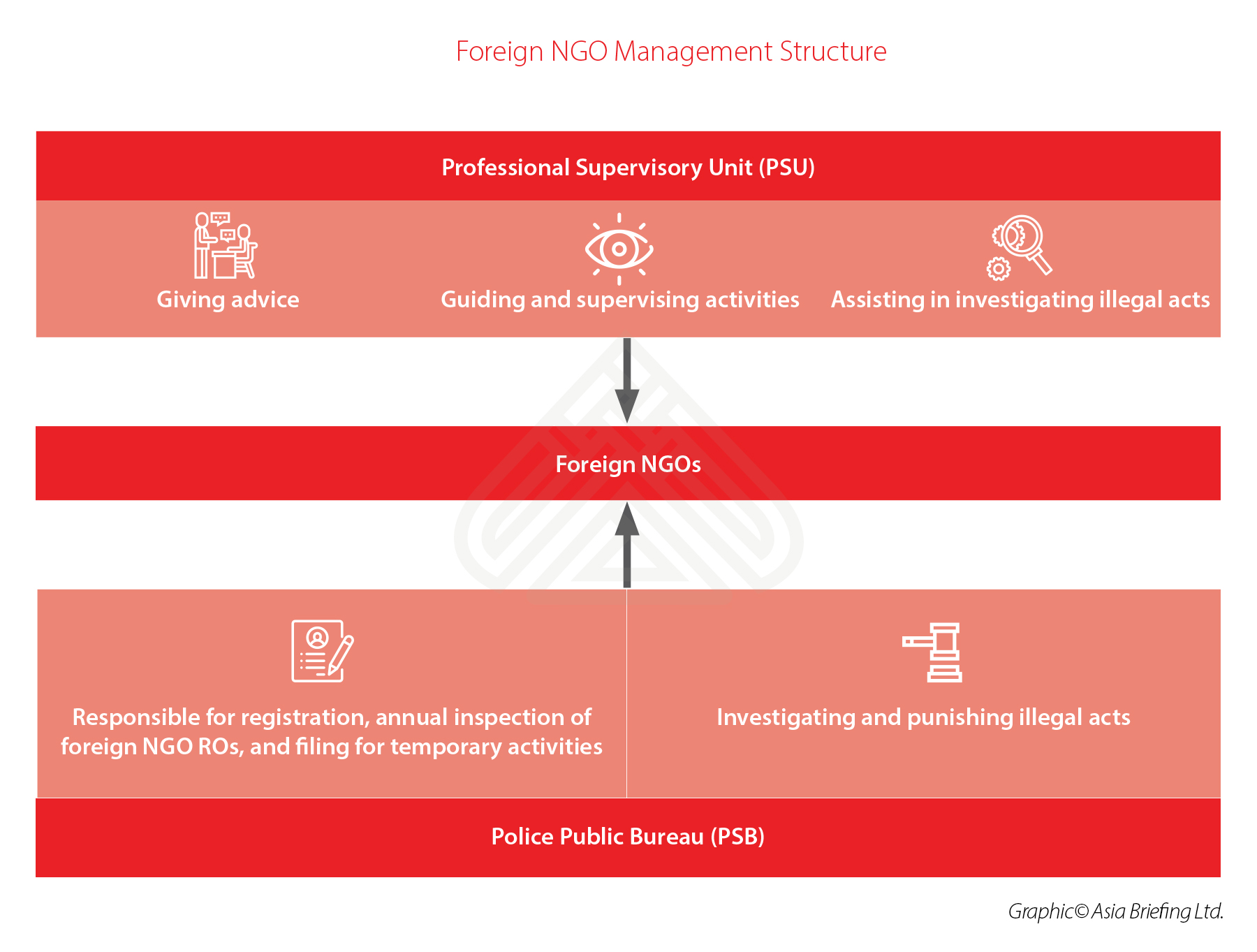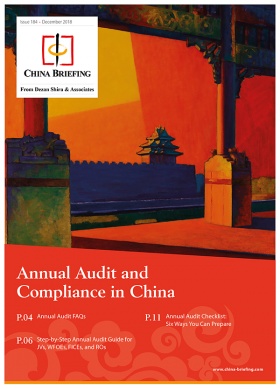Setting Up a Foreign NGO in China
China Briefing summarizes key elements of the Overseas Non-Governmental Organization (NGO) Law and provides step-by-step guidance for setting up foreign NGOs in China.
China’s first Overseas NGO Law took effect January 1, 2017. Together with other regulations, the law provides systematic provisions on the management and legal liabilities of foreign NGOs operating in China.
Prior to taking effect, China’s Ministry of Public Security (MPS) published guidance on the law November 28, 2016 – for foreign NGOs seeking to register their representative offices (RO) and conducting activities in the country.
In this article, we break down the legal essentials that foreign NGOs must pay attention to when looking to set up in China.
How can foreign NGOs enter China?
According to the Overseas NGO Law, foreign NGOs, including foundations, social groups, think tanks, and other non-profit, non-governmental social organizations from Hong Kong, Macau, Taiwan, and foreign countries, have two ways to operate in China: setting up an RO in China or conducting temporary activities after filing the activities with relevant authorities.
Establishing an RO in China
Criteria for establishing an RO
A foreign NGO must meet the following criteria in order to establish an RO in China:
- It must be able to undertake civil liability independently, meaning that in the case of a lawsuit, it must be able to pay damages or other court-enforced payments.
- It must have been established for a minimum of two years before applying to set up an RO in China, and it is required to function substantively.
- It is a legal entity in its home country.
- It must have clear objectives, and a business scope that can benefit community projects and development in China. Encouraged fields for foreign NGOs include sport, culture, health, technology, economy, education, and environmental protection.
Application procedures
Once a foreign NGO has concluded that it meets the criteria for establishing an RO in China, it can reach out and apply to the relevant unit for the latter to be its Professional Supervisory Unit (PSU).
A foreign NGO can find its relevant PSU in the List of Fields of Activity, Categories of Projects and Professional Supervisory Units for Overseas NGOs (2017 edition) in light of its scope of operations, area, and purpose of activity.
If the PSU concludes that the NGO meets all the necessary criteria, the NGO can then submit its application documents and materials to the overseas NGO administration office of the Provincial Public Security Bureau (PSB) in the location where they propose to establish an RO – within 30 days.
Once the foreign NGO has submitted its application, the PSB will review it. If necessary, the PSB may call in experts to assess the application in order to come to a final decision.
If the registration is approved by the PSB, the foreign NGO will be issued a registration certificate that includes the name, address, scope of business, name of the chief representative, governing authority, and operating areas of the RO.
The NGO’s certified RO will then present its certificate to the tax authorities. Once the organization seal (chop) has been engraved, the RO will be able to open a bank account with a local Chinese bank.
The RO must then give a file containing a photocopy of its seal, bank account number, and tax registration number to the registration and administration authority for record-keeping.
Materials required for submission to establish an RO
In order to establish an RO, the NGO must submit the following documents to the PSB:
- Application Form for Establishment of RO of Overseas NGO (Form 1);
- Form for Registration Matters of RO of Overseas NGO (Form 2);
- Registration Form for Chief Representative of RO of Overseas NGO (Form 3);
- Authorization for registration of establishment of RO from the overseas NGO;
- Proof documents and materials showing that the overseas NGO is lawfully established overseas;
- Articles of association of the overseas NGO;
- Proof materials showing that the overseas NGO has been established overseas for two years or more and has carried out activities substantively;
- Identity document and curriculum vitae of the Chief Representative of the proposed RO;
- Statement of No Criminal Record of Chief Representative of RO of Overseas NGO (Form 4);
- Proof materials of the address of the proposed RO;
- Proof materials for source of funding; and
- Consent document of the PSU.
Documents required to be notarized and authenticated
The RO must submit documents identifying the foreign, Hong Kong, Taiwan, or Macau resident who has been chosen to be the representative for the RO.
Additionally, the NGO should submit its articles of association, provide proof that it has been established overseas for a minimum of two years, and that it functions substantively.
These documents must be notarized by a notary organization in the NGO’s home country and authorized by the relevant Chinese embassy or consulate.
Although the process is generally the same, NGOs located in Hong Kong, Macau, and Taiwan face slight differences as to the notarization and authentication process for establishing an RO.
NGOs lawfully established in Hong Kong must submit the same documentation as foreign NGOs; however, they must be notarized by a notary public recognized by mainland China.
For Taiwanese residents, the identification documentation required for the Chief Representative is the Mainland Travel Permit for Taiwan residents. Taiwanese NGOs must be notarized by a notary public in Taiwan.
For residents of Macau, the documentation is the same as for foreign NGOs, but the documents can be notarized by either the notary department of the Macau Special Administration Region Government or another notary public recognized by mainland China.
Determining a name
Overseas NGOs have very little say in the naming of their RO in China. The final name is composed of a number of different components that identify the NGO, which include the following:
- The name of the overseas NGO;
- The overseas location (region or country) where it was originally registered;
- The name of the location in China; and
- The title ‘Representative Office’ (‘Liaison Office,’ etc.).
After registration, the foreign NGO shall clarify their scope of activities in the mainland of China. The area of activity shall be in line with its scope of operations.
Conducting temporary activities
Except for setting up an RO, foreign NGOs are allowed to conduct temporary activities in coordination with a Chinese partner. The Chinese partner can be a state organ, a Chinese people’s organization, a public institution, or a social organization.
Procedures
The Chinese partner shall handle examination and approval procedures in accordance with state regulations and submit documents to the overseas NGO management office of the MPS or the provincial PSB for their records – 15 days before temporary activities commence.
However, in emergency situations, such as disaster relief and rescue operations, the overseas NGO doesn’t need to obey the 15-day rule.
If the registration authorities believe that the temporary activities on record is not legal, the temporary activities shall be immediately ceased.
After the completion of the activity, the Chinese partner must report in writing about the activity and the use of funds to registration authorities within 30 days.
The duration of temporary activities shall not exceed one year; where there is a need to extend this deadline, documentation and information shall be re-submitted for the record.
Documents required for applying to conduct temporary activities
- Documents for the Record for Temporary Activities of Overseas NGO (Form 11);
- Documentary and material evidence of the legal establishment of the overseas NGO;
- A written agreement between the overseas NGO and its Chinese partner;
- Evidence of costs and funding sources as well as the bank account details of the Chinese partner; and
- Approval documents obtained by the Chinese partner.
All the documents concerning the overseas NGO submitted above shall be notarized and authenticated.
Stay on top of compliance
With the implementation of the Overseas NGO Law, foreign NGOs face increased police supervision and scrutiny by the Chinese government.
The law is seen by many as a crackdown on the freedoms of foreign NGOs, as it subjects foreign NGOs to police supervision and demands that they declare the sources of their funding.
Foreign NGOs looking to establish an RO in China must understand the changes in the application process, and the new environment in which they will be operating. Seeking local expertise is advised.
(Editor’s Note: This article was originally published in December 2016 and has been updated.)
About Us
China Briefing is produced by Dezan Shira & Associates. The firm assists foreign investors throughout Asia from offices across the world, including in Dalian, Beijing, Shanghai, Guangzhou, Shenzhen, and Hong Kong. Readers may write to china@dezshira.com for more support on doing business in China.
- Previous Article How China’s New Income Tax Law Affects Expatriates
- Next Article Chinas Umweltpolitik: Zuckerbrot und Peitsche
